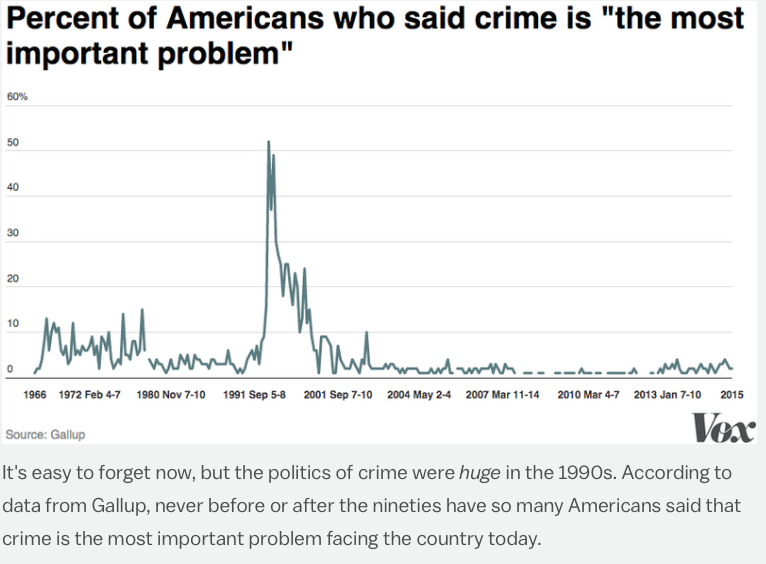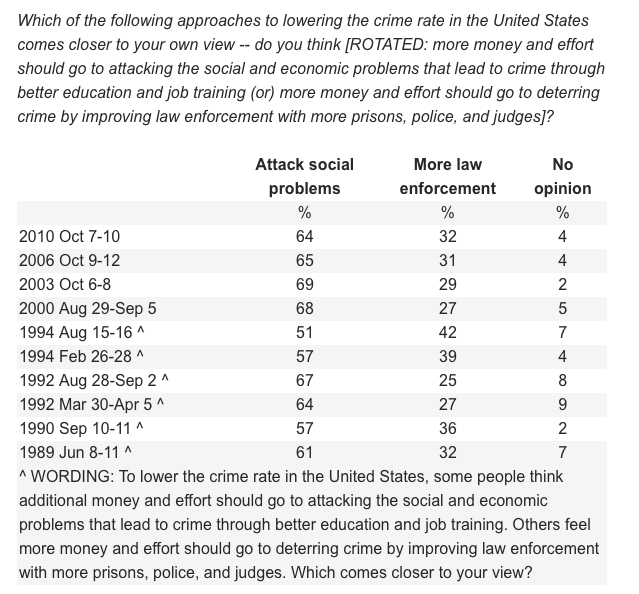Mass incarceration and the presidential candidates
Blaming the 1990s public for mass incarceration is too simple of an answer.
by Peter Wagner, September 3, 2015
For an essay about the Democratic presidential candidates reversing their previous support for tough on crime measures, German Lopez pulls up some fascinating data, although I’m not quite sure he puts the emphasis in the right spot.
First, Lopez is absolutely right that private prisons aren’t why we have mass incarceration. And he’s correct on his main point that “liberals like Hillary Clinton, Joe Biden, and Bernie Sanders supported the 1994 crime law that contributed to mass incarceration” simply because, well, they were politicians in the 1990s. At that time, “all politicians — liberal and conservative — t[ook] a tough stance on crime.”
And he’s spot-on about how political power works and why the people powerful enough to run for president in the present typically had to be on the winning side in the past:
Popular demand for tough-on-crime laws in the past doesn’t in any way excuse the devastation lawmakers inflicted on millions of people through mass incarceration and other policies. But based on voters’ concerns in the 1990s, if a politician didn’t contribute to the problem back then, he or she may not be prominent enough to run for president today. That’s how America ended up with mass incarceration — and the seemingly contradictory Democratic presidential candidates for 2016.
However, the article offers an overly simple answer to “the simple truth about why mass incarceration happened.” By concluding that “the public wanted mass incarceration”, Lopez stops one step too short.
Lopez relies on this chart showing the portion of the country that considered crime “the most important problem”:
What could possibly be responsible for the number of people identifying crime as “the most important problem” jumping from almost nothing in 1991 to more than half the population in 1993? (And a related question that I’ll address later is: Did the public really want Congress to double down on cops, courts, and cages?)
To be sure, crime was higher than it is now and was rising in the 1980s and early 1990s, but the crime rise on its own was far too subtle to cause that spike in public concern. As the opening to the video that Lopez embeds so brilliantly demonstrates, the media (and ideologues manipulating the media) created that crime focus.
Joel Dyer has a whole chapter in his now-dated book about the rise of what he calls the Perpetual Prisoner Machine focusing on how the television news of that era manipulated public fear of crime because it got good ratings and because crime reporting was inexpensive to produce.
As David Mendoza brilliantly showed last year, Americans are consistently bad at knowing whether the national crime rate is going up or down. Most years, most Americans think crime is rising even though it’s been in decline for years. Of course, it’s hard for a single American to know from personal experience whether crime is rising or falling, so the media has a big influence there. Similar public opinion polling that asks whether crime is rising or falling in your neighborhood shows a much smaller disconnect with actual crime rates, offering clear evidence that Americans aren’t stupid but they are (or were) being lied to.
Now despite that, I think there are reasons in a different set of Gallup data to be optimistic: In contrast to the actions of elected officials, Americans have long favored attacking social and economic problems as a crime control strategy over spending more on law enforcement. Even at the low point in 1994, a clear majority of Americans (51%) supported attacking social and economic problems and only 42% favored using more police and prisons to deter crime:
So that gets back to the original question about the presidential candidates who created this problem with their rush to pander to the television cameras: What do the candidates think is the best way to undo the harm their policies caused?






Lenny Singleton is the perfect example of why mass incarceration should be re-evaluated by all the presidential candidates. It will cost the American taxpayers well over a million dollars to keep Lenny for the rest of his life — He received 2 Life Sentences plus 100 years for stealing less than $600 and no one was physically hurt??? Learn more at http://www.justice4lenny.org.